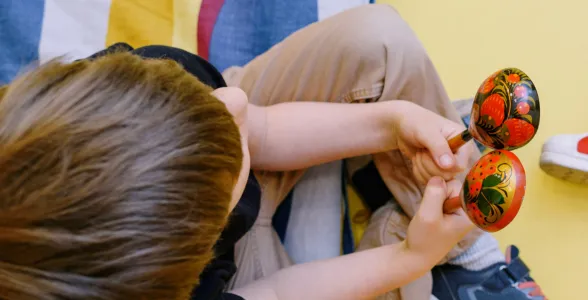
What Music Can Do When Words Are Lost
When someone is living with dementia, communication can become more difficult. Words may slip away, memories may blur, and the world can feel harder to navigate. Yet so often, music remains - sometimes long after language has faded.
Music can reach places that conversation can’t. A familiar song might unlock a moment of recognition or calm. A steady rhythm can offer focus, encourage movement, or bring comfort in times of confusion. It isn’t about performance or entertainment; it’s about human connection.
As Music Therapists, we see every day how music can reawaken relationships, spark memories, and bring a sense of belonging to hand. Often, the most powerful moments happen quietly: a shared beat, a hum, or a smile across the room.
The therapeutic potential of music
- Repetition builds recognition
As cognitive changes affect how people process information, familiar patterns and repeated phrases can help re-establish a sense of continuity. Repeating a well-known chorus or rhythm gives time for recognition to surface, and that moment can be deeply reassuring.
- Rhythm creates flow and calm
Many people with dementia respond instinctively to rhythm. Gentle, steady beats can help regulate breathing and movement, and can be grounding for those experiencing anxiety or disorientation. Simple rhythmic play, such as tapping or using small percussion instruments, can bring people together without words.
- Music restores identity and belonging
The songs we know and love become part of our life story. Bringing those songs into care through singing, listening, or shared activity helps reconnect the person with their history, relationships, and sense of self. Even when words are lost, music helps the person’s story remain present.
Bringing music into care
In care homes and community settings, music can be used in small, meaningful ways. Playing a favourite song while supporting daily routines, singing together during activities, or creating opportunities for quiet listening can all help people feel more at ease.
The power of music in dementia care lies not only in what it does, but in what it reminds us of: that the person is still there, still capable of feeling, responding, and connecting.
At Chiltern Music Therapy, we work alongside care professionals to help them use music intentionally - not as a performance, but as part of compassionate, person-centred care.
Learning more about music and dementia
If you’d like to explore this further, our online Music in Dementia Care course explores these ideas in more depth, combining insight into the therapeutic role of music with practical approaches that care teams can use to create positive listening environments and bring comfort at all stages of dementia.
You can also find our Care Homes Resource Pack, which offers ready-to-use recordings and activity ideas to make music an easy part of everyday care.
Both resources are part of the Chiltern Online Learning Space, designed to make music therapy knowledge more accessible to everyone working with or caring for people with dementia.
Support our Work
Help us to provide Music Therapy to the most vulnerable and isolated members of our society
Donate here

.webp)


.png)